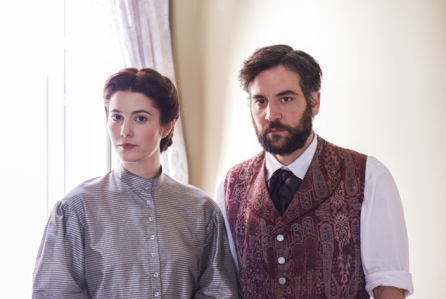 With the end of “Downton Abbey” next year, PBS is looking for a replacement series to serve its large audience for historical costume drama.
With the end of “Downton Abbey” next year, PBS is looking for a replacement series to serve its large audience for historical costume drama.
They’re trying to do so with not another British import, but their first home-grown series in a long time, “Mercy Street,” a saga set during the Civil War in Alexandria, Va., where a hotel was seized by Union forces and turned into a hospital.
The series gave work in and around Richmond, Va., for a variety of actors for the costume drama that premieres this fall on PBS. But talk at a season of the TV Critics Association summer press tour Saturday turned to its follicular aspects.
For Josh Radnor, who plays a civilian contract surgeon at the makeshift hospital, said that after spending seven seasons starring on “How I Met Your Mother,” “I thought, ‘I’d like to do something where I get to have an unironic mustache.’
“And then I got ‘Mercy Street,’ and I said, ‘No, this is unironic and requires facial hair.’”
He did take some serious consideration of the beard he grew, though., and how it reflected his character. “He has studied medicine in Europe, which was a signifier of kind of wanting to be on the cutting edge of what was going on in medicine,” Radnor said. “And I didn’t I don’t think he has a lot of vanity. I think he just wants to help people. I don’t think he spends a lot of time in front of the mirror, so I just let it go.”
Norbert Leo Butz, who plays a gruff army surgeon bent on amputation, extolled “the encyclopedic knowledge on facial hair of the period that we had on set with us, it’s really extraordinary to look at what these men did to their faces.”
But, he added, “It’s also extraordinary to go into hipster neighborhoods, like Williamsburg, Brooklyn, in 2015, and see the exact same facial hair on some of these guys.”
The prevailing hairstyles of the 1860s, Butz says were “strangely modern looking.”
“The men wore their hair longer. There was tremendous variety, and they gave us room to do that,” he said.
“It was also a weird time,” Radnor says. “Like, when you flip through those photographs, you’re like oh, really, anything goes. Any idea you had about what you can pack into your beard.”
North and South soldiers were interchangeable with their looks, Butz says.
For his character, Dr. Byron Hale, “I sort of came up with a Colonel Sanders-y” look, Butz says. “I wanted Hale to look like he had really really considered what his facial hair was going to be.”
And it got complicated, he said. “When facial hair starts to become a real issue, is when it gets long enough. I had this goatee, actually. And when it gets long enough, you actually have to shampoo it separately from the rest of your hair. It might collect things and catering on it.”
Actor Jack Falahee was one of the few portraying a real person, Frank Stringfellow, so he had to follow that particular hairstyle. “I have short hair on the show,” Falahee said. “Many of the Southern men had longer hair but then lice would come into the camps, and so they’d cut all their hair off. So at this point in the war, we figured Frank probably already had some lice, so shaved the beard. And I didn’t shampoo my hair for an entire three months because they told me not to.”
Gary Cole, who plays the patriarch of the Southern family who owns the hotel, brings up the story of Gen. Burnside, whose legacy lives in facial hair terms.
“I don’t know why they’re not called ‘burnsides,’” he said, “but they’re called “sideburns.”